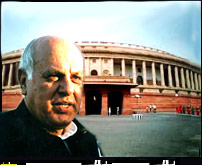Though the state government blames the Centre's financial hard-heartedness, there are many in Kashmir who believe it is not Delhi that is at fault, but Dr Farooq Abdullah himself. The funds are adequate, they say, but the chief minister and his colleagues are misusing it.
Dr Abdullah's image as a golf-playing, fun-loving chief minister doesn't help matters any. "Do you know how much money he spent doing up his house in Jammu before the durbar move? Rs 20 million!" one such critic alleges.
There is also a section that believes it is not Dr Abdullah who's the root cause of the trouble, but India. The chief minister, they say, is just the pawn. The real culprit is Delhi, which has deliberately gone about making Kashmir dependent on doles and subsidies, thus sabotaging their economic independence.
"The Indian government wants Kashmir economically dependent," claims Usmaan Raheem Ahmad of the United States-based Council for an Independent Kashmir. "India does not want Kashmir to develop its economic teeth and become self-reliant. Corrupt puppet leaders like Farooq Abdullah, would prefer to follow this policy since they depend on kickbacks from India to sustain their lavish lifestyles."
And how does India achieve this? Ahmad is only happy to explain:
"Take the example of apple growers in Kashmir. Apples were adopted as one of the new cash crops that followed subsidisation. Now the apple growers in towns like Sopore are in a terrible predicament. The only market Kashmiris currently have is India.
"So every year apples are taken to Delhi, where a blackmailing game is played. Delhi's heat turns the apples into brown mush, and fruit-sellers know that if they wait just long enough the Kashmiris would have no choice but sell it at cheap, unprofitable prices. While the growing of apples was encouraged by the J&K government, there was no investment or promotion of infrastructure such as bottling and canning factories or bulk storage areas," he says.
Ahmad believes that left alone, Kashmir would have no trouble surviving -- has it not been independent for most of its history? Jammu and Kashmir Liberation Front leader Yasin Malik agrees.
"Once it is re-united and independent, Kashmir has the potential of becoming a prosperous nation within a short period of time," asserts Malik.
Ahmad has more to say on how this would come about. "The state has tremendous natural resources, which is really a major factor for India and Pakistan's unwillingness to let go of Kashmir, like an abundance in fertile land, forests, massive rivers and lakes, and precious minerals and jewels," he says.
"Kashmir's hydropower potential is more than 15,000 MW. Even with massive Indian and Pakistani dams on both sides exploiting its water, only 1.2 per cent of it has been tapped so far. With environmentally low-impact projects and proper planning, the state can generate many times more power than needed. The surplus can be sold to India and Pakistan.
"Properly managed, Kashmir's forests can provide enough timber to export as well. Better yet, finished goods, like the famous Kashmiri carved wood furniture, can be exported throughout the world," Ahmad feels.
Many see Article 370 of the Indian Constitution as a major hurdle in Kashmir's economic path.
India's relation with the state is through this Article. It was incorporated as a temporary provision to regulate relations between the state and the Union of India. One of the provisions it granted J&K was that residuary powers -- those that are not listed on the central or state list -- were vested with the state. This directly limits the power of the central government over the state government.
The Article bars a non-Kashmiri from buying land in the state. This, critics say, adversely affects economic development. After all, in a day when economic borders are crumbling and capital is global, a law that prevents purchase of property is a clear impediment to investment and the economic development of the state, they argue.
"As long as businessmen cannot buy property," a hotel manager says, "no one will set up factories or even luxury hotels. Kashmir will always remain undeveloped and poor, and thus a haven for militancy until this law is abolished."
Dr Abdullah refutes these claims. "Any businessman can get property on a 99-year lease and develop it," he said in an interview to rediff.com.
A keen Kashmir watcher supports this claim: "If non-Kashmiris cannot buy property, how come all the Indian nationalised banks have set up branches in the state? So obviously there is a way around this law."
The Centre, meanwhile, is finalising a package that might help Kashmir on to its feet.
"It will give financial thrust to the local people, especially those in the villages," says a senior home ministry official.
"We are looking at the possibility of developmental programs that can have impact mainly on the villages. Areas like tourism development and agriculture will be focused on."
Additional reportage: Mukthar Ahmad
Day 10, December 18: How much longer?




